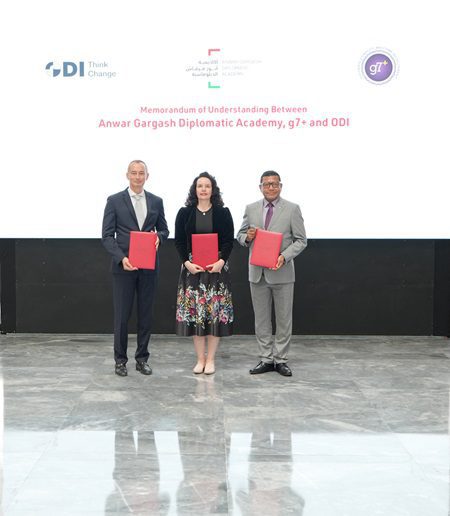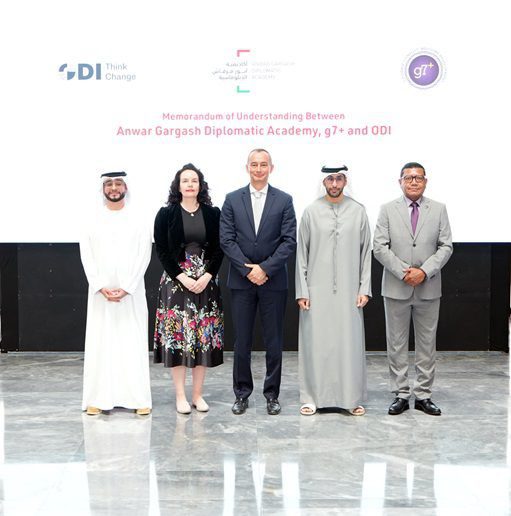The Anwar Gargash Diplomatic Academy (AGDA), a globally leading diplomatic centre of excellence in the UAE, g7+, an intergovernmental organisation of 20 countries that promotes peace and stability through advocacy on aid effectiveness, and ODI, a UK-based independent, global affairs think-tank, announced a new coordination mechanism to drive climate action in fragile and conflict-affected areas, in support of the landmark COP28 UAE Declaration on Climate, Relief, Recovery and Peace.
The mechanism, launched on 10th June in Abu Dhabi in the presence of UAE Assistant Minister of Foreign Affairs for Energy and Sustainability Affairs, H.E. Abdulla Balalaa, aims to stimulate climate action and finance to countries and communities facing conflict, fragility or severe humanitarian needs.
The severe gap of resources to build climate resilience in these contexts emerged as a key theme at COP28 in Dubai in December, with 91 countries and 43 organizations committing to redress the disparity.
H.E. Nickolay Mladenov, the Director-General of AGDA,
spoke of the importance of climate diplomacy in regions affected by fragility or conflict, saying, “In the run up to COP28, we launched the AGDA Centre for Climate Diplomacy which aims to advance effective climate change research with special attention paid to the risks of mitigating climate change in conflict zones.
The primary objectives of the centre include coordination of a shared research agenda with think-tanks, academic and research institutions to serve as a regional hub for climate research, underlining the importance of research in guiding the UAE’s foreign policy on climate change and inspiring ambitious climate action in others.”
He added, “By signing this agreement with g7+ and ODI, we are facilitating crucial action and dialogue to ensure the COP28 UAE Declaration on Climate, Relief, Recovery and Peace continues to translate into more and better programs, practice and finance.
As part of the coordination mechanism, we are convening finance providers over the coming days to find tailored programming and finance solutions for fragile and conflict-affected countries and communities to ensure that those in the most challenging situations can build climate resilience too.”

ODI’s Perspective
According to the ODI, people living in conflict-affected countries are some of the most vulnerable to climate change, but they often receive far less climate finance to support urgently needed adaptation and resilience efforts. ODI research reveals that between 2010 and 2018, countries in the Horn of Africa and the Sahel region received just US$2-13 per capita in climate finance, compared to an average of $18 for ‘Least Developed Countries’ not experiencing conflict, which already receive comparatively marginal finance.
Expert Opinion
Mauricio Vazquez, Head of Policy for global risks and resilience at ODI, said “The key challenge is getting different parts of the community to come together. This new mechanism is about getting all actors in the same room to address the root causes of climate vulnerability in fragile and conflict-affected places – treating the causes, not just the symptoms, of climate related disasters.”
Also speaking at the signing ceremony, Helder da Costa, General Secretary of the g7+, the inter-governmental organization group of 20 conflict-affected countries, said, “There is an urgent need to address a blind spot in the Paris Agreement whereby conflict-affected countries that have been the least responsible for climate change are disproportionately affected by its impact. We hope this new coordination mechanism will mobilise consensus among all actors on how best to build resilience in these countries and ensure that finances reach those people who are most in need to tackle the impacts of climate change.”
Coordinated Efforts and High-Level Commitments at COP29 in Baku
The mechanism will coordinate efforts from the large group of supporting organisations and governments that created the political momentum for the Declaration. As part of the commitments made in the declaration, the coordination mechanism, UAE and other partners will convene a high-level meeting at COP29 in Baku in November 2024 to assess progress on the declaration and initiate further action.
The United Arab Emirates is a longstanding advocate for climate, peace and security, and earlier this year announced a new US$ 1.2 million partnership with the United Nations Climate Security Mechanism (CSM), reinforcing the nation’s support for urgently required climate, peace and security programming around the world. The UAE support includes dedicated funding for a Climate Security Advisor at the UN Assistance Mission in Afghanistan to assess and mitigate the serious climate security risks in the country.


